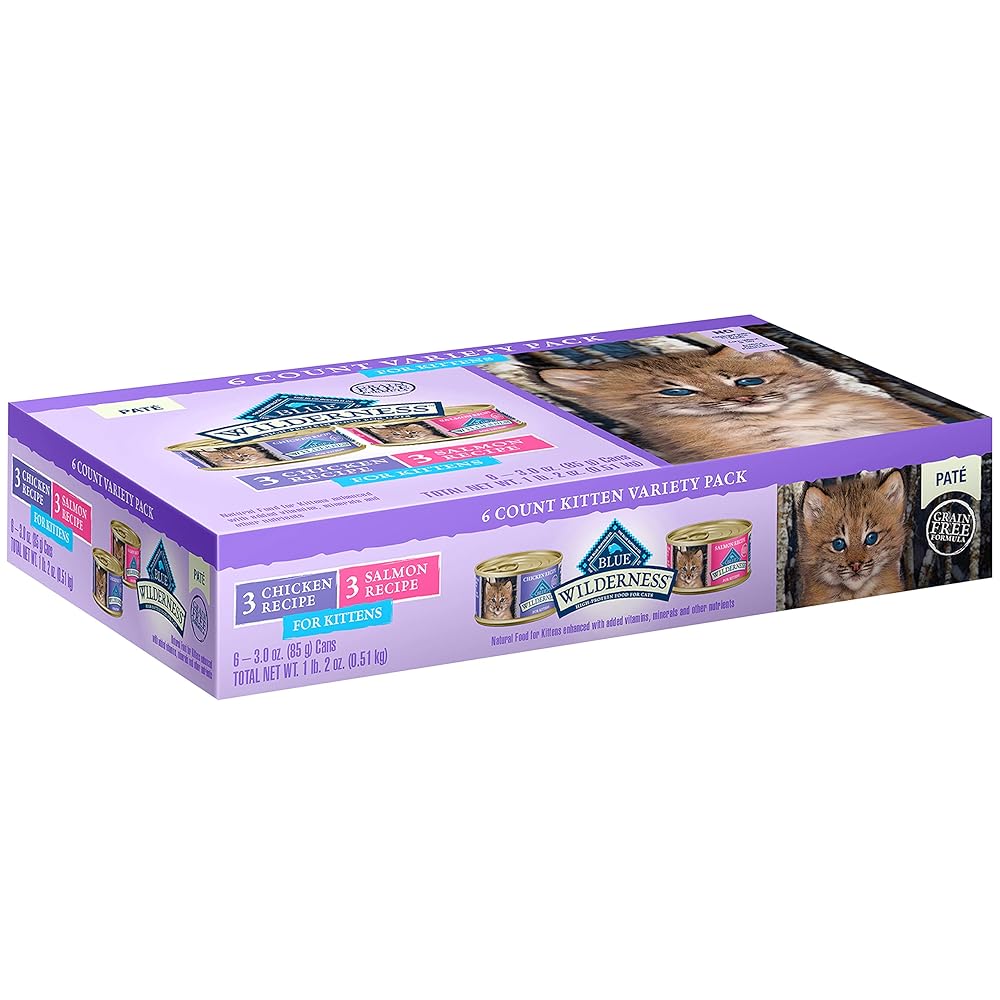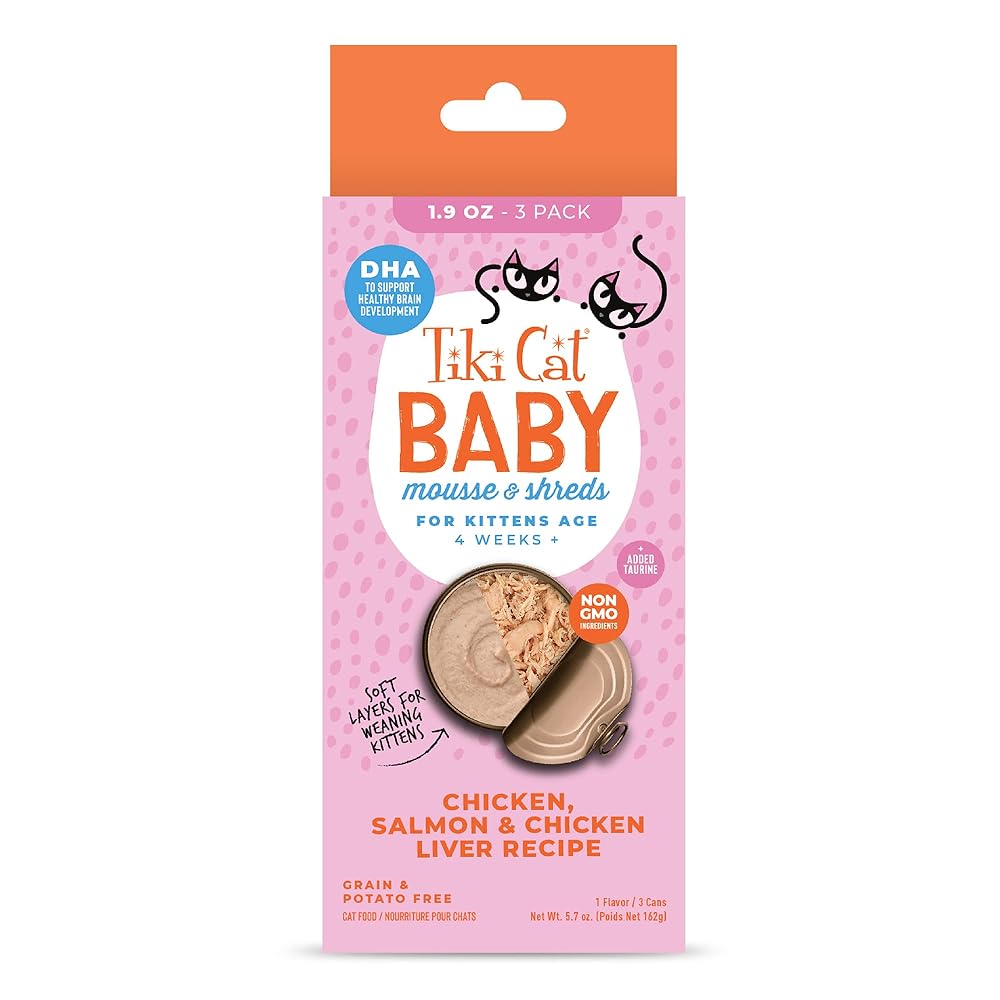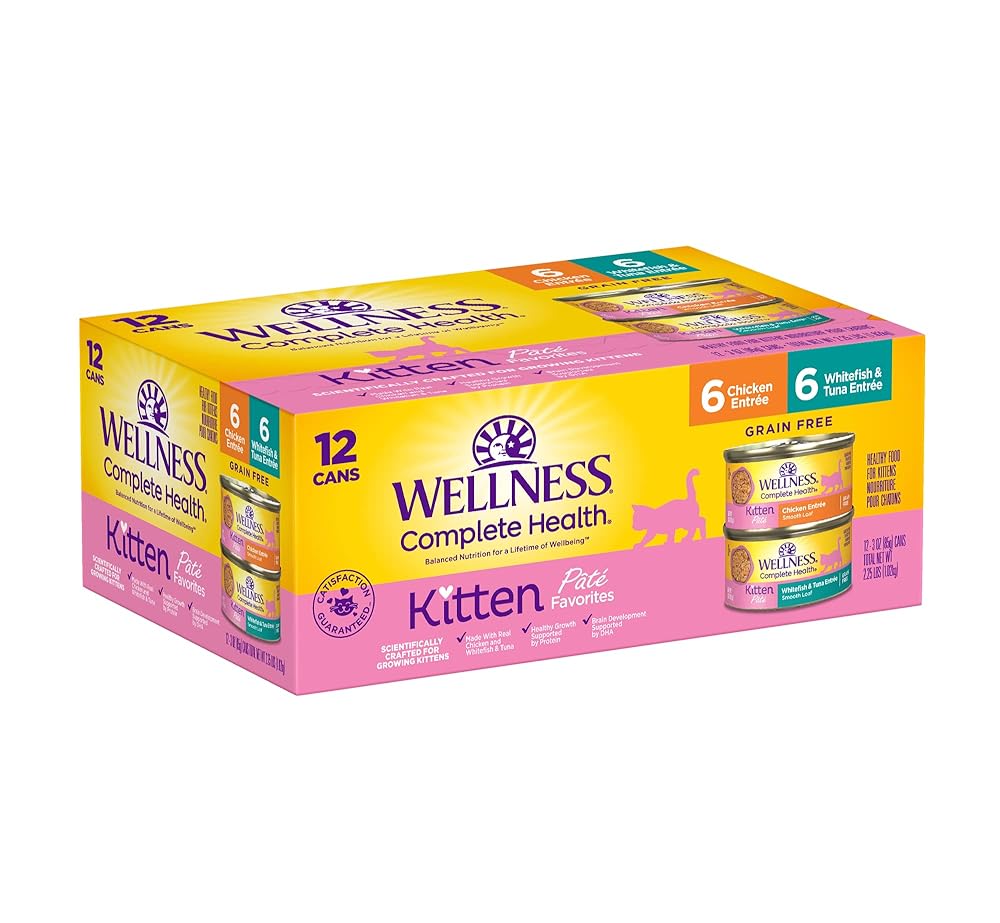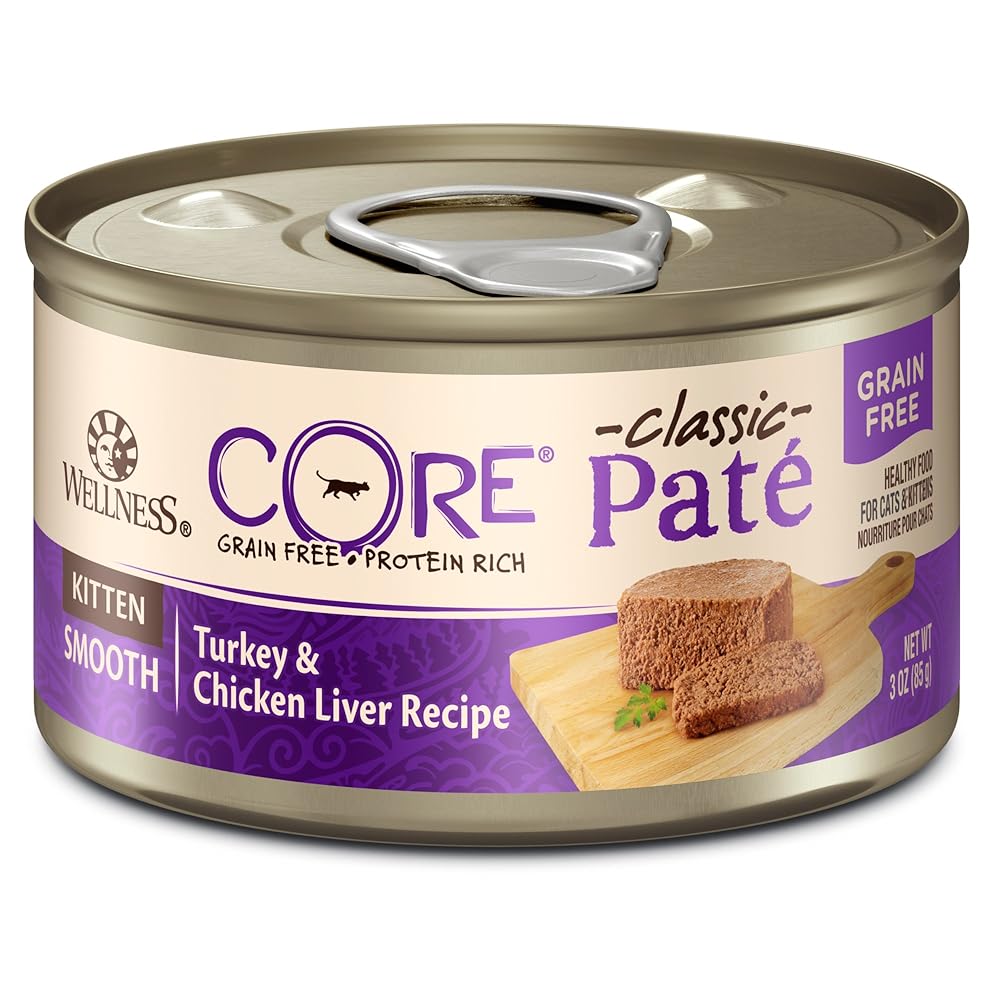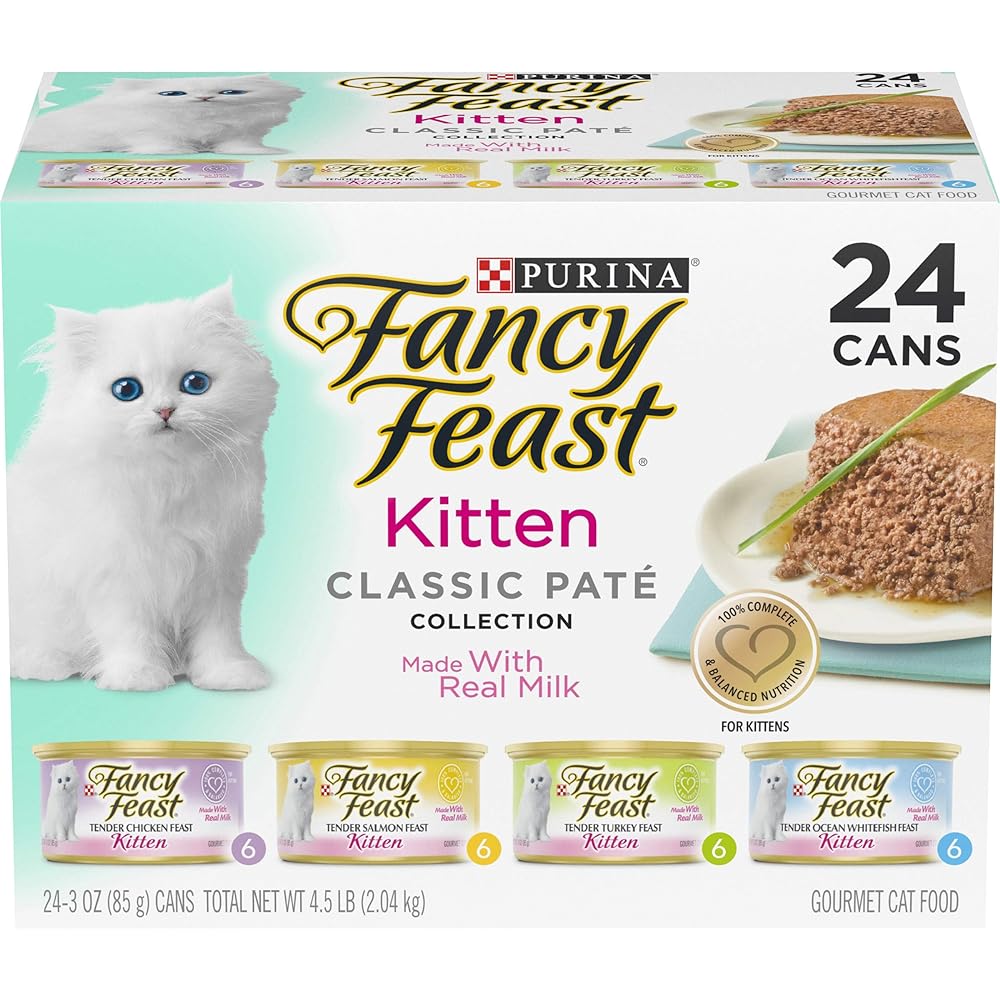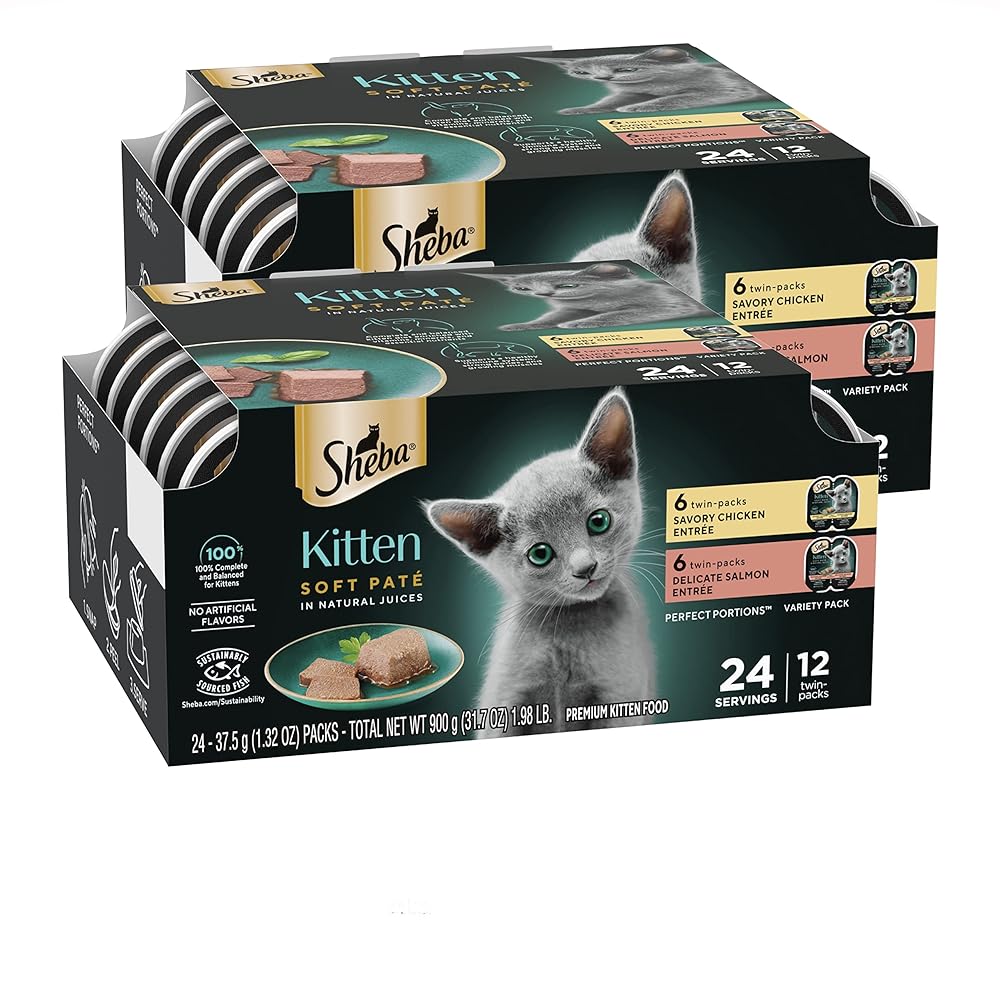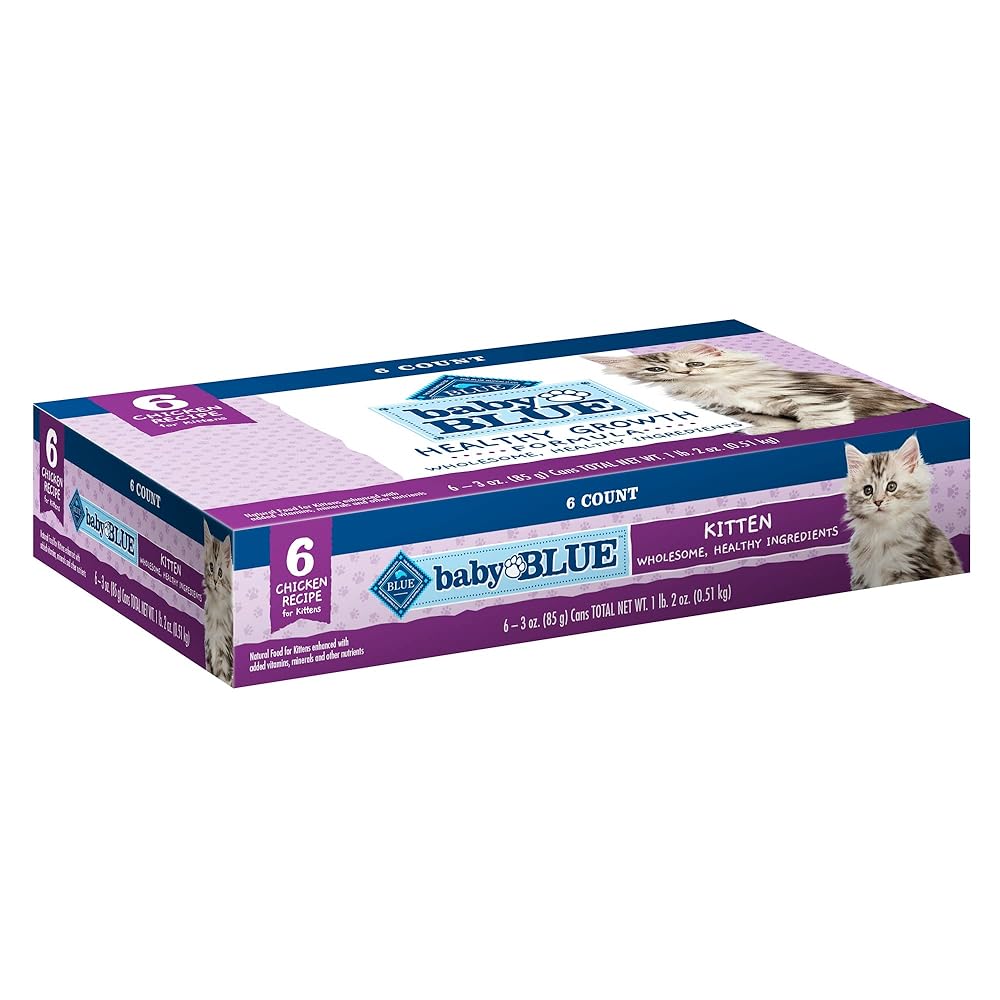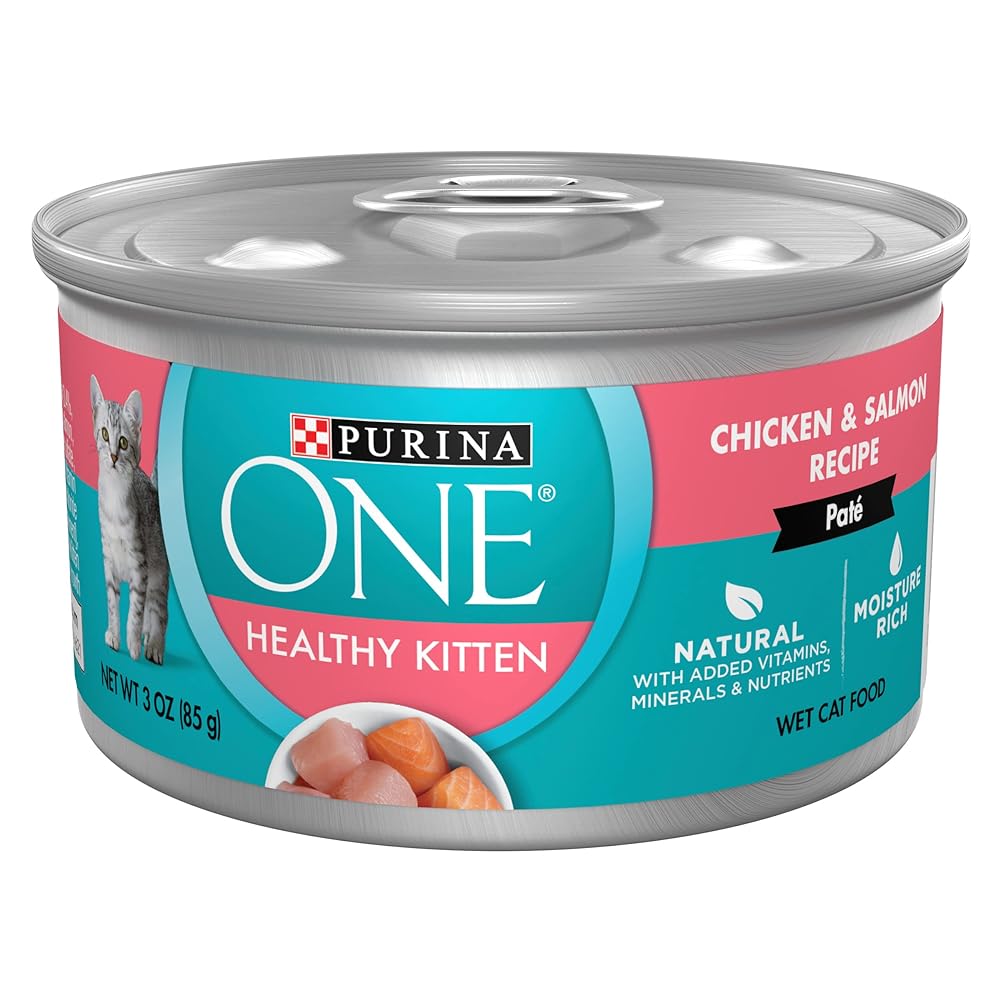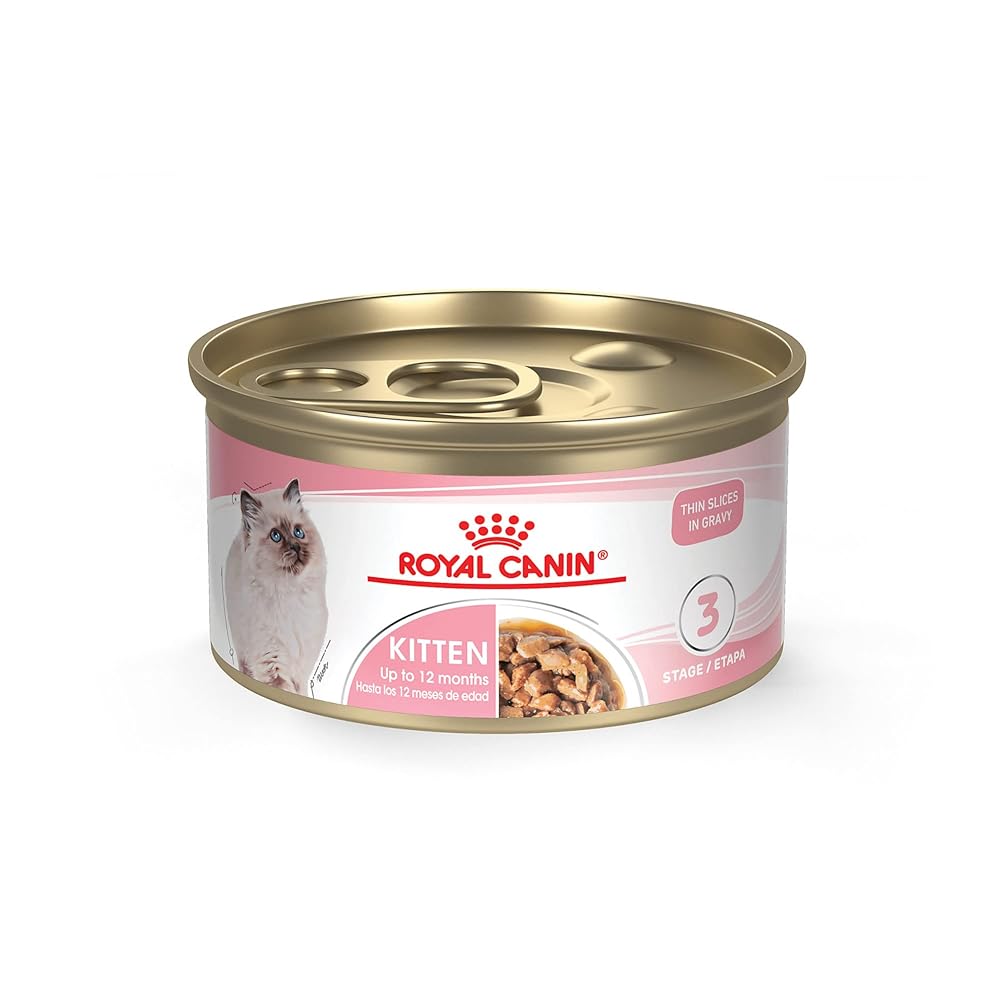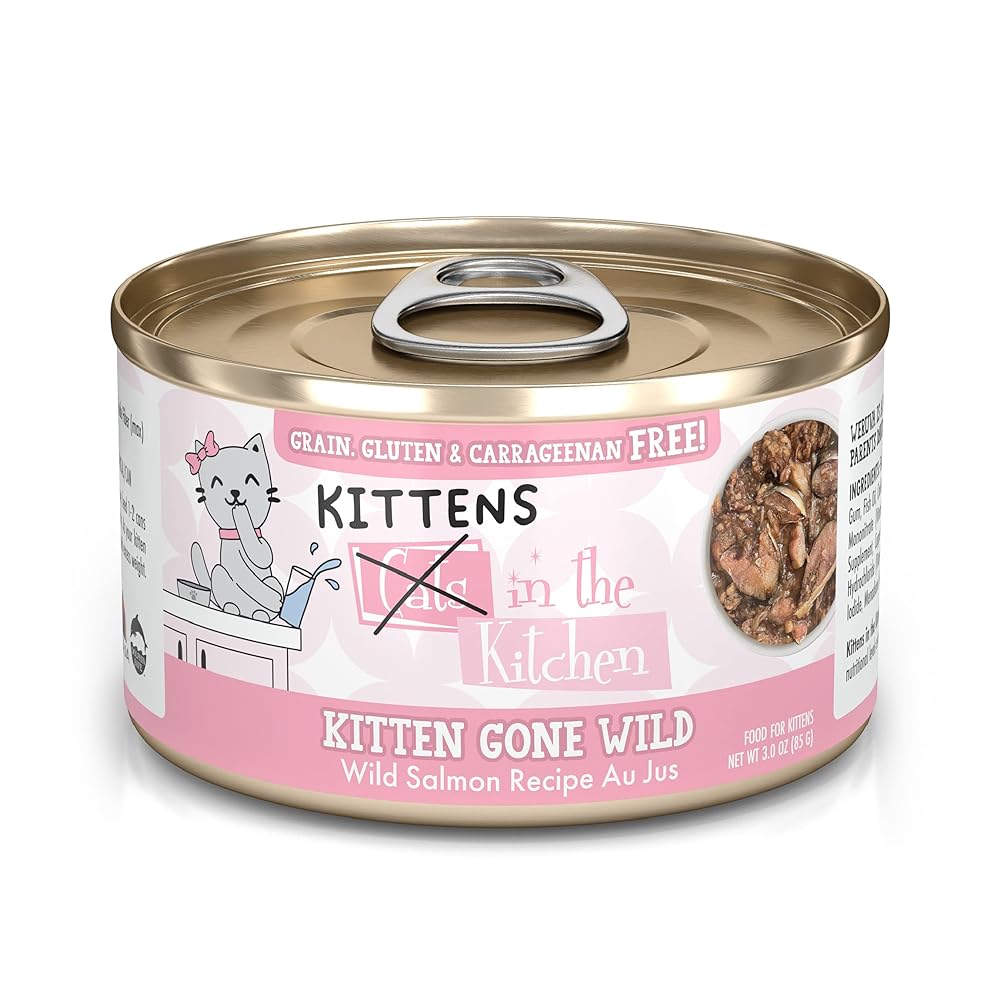iHeartCats is reader-supported. When you buy via links on our site, we may earn an affiliate commission at no extra cost to you.
Choosing the right food for your kitten is a pivotal decision that can set the stage for a lifetime of health and well-being. Kittens have specific nutritional needs that differ substantially from adult cats, requiring more protein, fats, and essential nutrients to support rapid growth, energy needs, and the development of vital systems like the brain, muscles, and immune system. This article will delve into the best-wet food options for kittens, taking into consideration factors like protein content, ingredient quality, and the presence of vital nutrients to ensure your feline friend gets the best start in life.
#1 – Blue Buffalo Wilderness High Protein Grain Free, Natural Kitten Pate Wet Cat Food Variety Pack, Chicken, Salmon 3-oz (6 Count- 3 of Each Flavor)
The Blue Buffalo Wilderness High Protein Grain Free, Natural Kitten Pate Wet Cat Food Variety Pack is a selection of canned cat foods designed specifically for kittens. It is made with real chicken or salmon, providing high levels of protein to support muscle growth, and contains DHA to promote cognitive development. The food is made with natural ingredients and does not contain any wheat, chicken by-product meals, corn, soy, artificial flavors, or preservatives.
Best For: Kittens seeking a high-protein, grain-free diet.
#2 – Tiki Cat Baby Mousse & Shreds, Chicken, Salmon, and Chicken Liver, High-Protein, Wet Cat Food for Kittens 4 Weeks+, 1.9 oz. Cans (Pack of 3)
Tiki Cat Baby Mousse & Shreds is a high-protein wet cat food specifically designed for kittens over 4 weeks old. It consists of delicate layers of mousse and tiny poultry shreds, making it an ideal option for helping young cats transition from breastfeeding. The food is rich in essential nutrients such as taurine, calcium, phosphorus, DHA, and prebiotics to support healthy development and aid in digestion.
Best For: Supporting healthy development in young kittens.
#3 – Wellness Complete Health Grain-Free Wet Canned Kitten Food, Made in USA with Real Meat, All Breeds, Smooth Pate (Kitten, Whitefish & Chicken Bundle, 3-Ounce Can, Pack of 12)
The Wellness Complete Health Grain-Free Wet Canned Kitten Food is a complete and balanced cat food that is free from grains and made with real meat. It comes in a variety pack of chicken pate and whitefish/tuna pate flavors, providing essential proteins and nutrients for kittens. This wet food also helps to support healthy hydration for cats.
Best For: Kittens in need of grain-free, protein-dense nutrition.
#4 – Wellness CORE Grain-Free Wet Kitten Food, Natural Canned Food for Cats, Made with Real Meat (Kitten, Turkey & Chicken Liver, 3 oz Can, 12 Pack)
The Wellness CORE Grain-Free Wet Kitten Food is a natural canned food for cats that is made with real meat. It is a high-protein and grain-free option that is fortified with vitamins and minerals to provide a complete and balanced diet for kittens. This wet food is also designed to support healthy hydration and does not contain any added carrageenan, wheat, soy, or artificial ingredients.
#5 – Purina Fancy Feast Grain Free Pate Wet Kitten Food Variety Pack, Kitten Classic Pate Collection, 4 Flavors – (24) 3 oz. Boxes
The Purina Fancy Feast Grain Free Pate Wet Kitten Food Variety Pack is a collection of 24 3 oz. boxes featuring four different flavors. It provides 100 percent complete and balanced nutrition for growing kittens, with real poultry or seafood as the main ingredient. The protein-rich recipes and smooth pate texture make it easy for kittens to eat, and it is made with real milk for added taste. This product is best for those looking for a budget-friendly and nutritionally complete wet food option for their kittens.
#6 – SHEBA PERFECT PORTIONS Kitten Paté Wet Cat Food Trays (24 Count, 48 Servings), Savory Chicken and Delicate Salmon Entrée, Easy Peel Twin-Pack Trays
The Sheba Perfect Portions Kitten Paté Wet Cat Food Trays are a convenient and balanced option for feeding kittens. This wet food is formulated with DHA for healthy brain development and supports the immune system, bone, and muscle health. The trays are portioned for easy serving and do not contain grains, corn, wheat, soy, artificial flavors, or preservatives.
Best For: Kittens in need of a convenient and balanced wet food option. (best overall)
#7 – Blue Buffalo Baby Blue Healthy Growth Formula Natural Kitten Pate Wet Cat Food Multi-Pack, Chicken Recipe 3-oz (6 Count)
The Blue Buffalo Baby Blue Healthy Growth Formula Natural Kitten Pate Wet Cat Food Multi-Pack is a high-quality kitten food made with real chicken and essential fatty acids to support healthy muscle and cognitive development in kittens. It is wheat-free and made with natural ingredients, vitamins, minerals, and other nutrients, without any chicken by-product meals, corn, wheat, soy, artificial flavors, or preservatives. This product is best for kittens who need a nutritious and natural diet that supports their growth and development.
#8 – Purina ONE Grain Free, Natural Pate Wet Kitten Food, Healthy Kitten Chicken & Salmon Recipe – (24) 3 Oz. Pull-Top Cans
The Purina ONE Grain Free, Natural Pate Wet Kitten Food is a canned kitten food that is made with real meat as the number one ingredient. It is a high-protein formula that is designed to support strong muscles and meet the nutritional needs of growing kittens. It is veterinarian-recommended and does not contain any artificial colors, flavors, or preservatives.
Best For: Growing kittens with a grain-free diet preference. (best ingredient sourcing)
#9 – Royal Canin Feline Health Nutrition Kitten Thin Slices in Gravy Canned Cat Food, 3 oz can
The Royal Canin Feline Health Nutrition Kitten Thin Slices in Gravy Canned Cat Food is specifically formulated for kittens up to 12 months old. It provides the optimal ratio of protein, fats, and carbohydrates to support a maturing kitten’s playful energy. The food also contains clinically proven antioxidants to help develop a strong immune system, as well as proteins, vitamins, and minerals for healthy growth and digestion.
Best For: Kittens in their first year
#10 – Weruva Cats in The Kitchen Kitten, Kitten Gone Wild, 3oz Can (Pack of 12)
The Weruva Cats in The Kitchen Kitten, Kitten Gone Wild, 3oz Can (Pack of 12) is a high-quality cat food specifically formulated for growing kittens. It contains a blend of premium seafood proteins including wild salmon, tuna, sardine, and mackerel in a delicious Au Jus. The recipe is grain-free, gluten-free, and carrageenan-free, and is made with real ingredients in human food facilities.
Best For: Kittens on a budget
What Should I Look for When Choosing a Wet Food for My Kitten?
When choosing a wet food for your kitten, there are several crucial factors to consider to ensure you’re providing the nutrition they need for healthy growth and development.
- High-Quality Protein Source: Look for a wet food where the first ingredient is a high-quality source of animal protein, such as chicken, turkey, or fish. Kittens are obligate carnivores and require a diet rich in animal protein for optimal growth.
- Nutrient Density: Kittens have higher nutrient needs than adult cats but smaller stomachs, so their food should be nutrient-dense. Look for foods fortified with essential vitamins, minerals, and amino acids like taurine, which is crucial for eye and heart health.
- Fat Content: Kittens also require a higher fat content for concentrated energy. Look for good sources of fat like chicken fat or fish oil which also provide essential fatty acids.
- No Harmful Additives: Avoid foods with artificial preservatives, colors, or flavors. These can be harmful to kittens and may trigger allergies or digestive issues.
- Moisture Content: Wet food is generally good for hydration, but it’s still important to check that the moisture content is appropriate. Well-hydrated kittens are less likely to suffer from urinary tract issues later in life.
- Digestibility: Opt for a brand that uses high-quality, easily digestible ingredients. This ensures that your kitten is getting the most nutritional benefit from their food and it’s easier on their developing digestive system.
- Consult Your Vet: It’s always a good idea to consult your veterinarian before making any significant changes to your pet’s diet, especially for kittens, who have specific dietary requirements.
By paying attention to these elements, you can select a wet food that not only satisfies your kitten’s hunger but also provides the nutritional building blocks they need for healthy growth and development.
What Are The Pros and Cons of Wet vs. Dry Foods for Kittens?
Both wet and dry foods have their own set of advantages and disadvantages when it comes to feeding kittens. Understanding these can help you make an informed decision that best meets the needs of your growing feline friend.
Pros of Wet Food for Kittens:
- High Protein Content: Wet foods often contain a higher percentage of animal-based proteins, essential for a kitten’s growth and development.
- Hydration: The high moisture content in wet food helps keep kittens well-hydrated, which is particularly beneficial for their developing urinary tract systems.
- Easier to Eat: The soft texture of wet food can make it easier for kittens to chew, making it a good choice for very young kittens or those with dental issues.
- Palatability: Many kittens find wet food more palatable due to its texture and aroma, which can be helpful for picky eaters.
Cons of Wet Food for Kittens:
- Cost: Wet food is generally more expensive than dry food per serving.
- Storage and Shelf Life: Once opened, wet food needs to be consumed quickly or refrigerated. Even unopened, it typically has a shorter shelf life than dry food.
- Dental Health: Wet food doesn’t provide the mechanical cleaning benefits that dry kibble can, so additional dental care may be necessary.
Pros of Dry Food for Kittens:
- Convenience: Dry food is easy to store and serve, and it can be left out for “free feeding” without worrying about spoilage.
- Dental Health: The texture of dry kibble can help scrape off plaque and tartar, although this should not replace regular dental care.
- Cost-Effective: Dry food is often less expensive and has a longer shelf life, making it a more economical choice for many owners.
Cons of Dry Food for Kittens:
- Lower Moisture Content: Dry food lacks the moisture content of wet food, so it may not be as hydrating.
- Higher in Carbohydrates: Dry foods often contain more carbohydrates, which are not as beneficial for kittens’ growth as proteins and fats.
- Harder to Chew: For very young kittens or those with dental issues, dry food can be more difficult to chew and digest.
Many veterinarians recommend a combination of wet and dry food for kittens to balance out the pros and cons of each type. As always, consult your veterinarian for personalized advice tailored to your kitten’s specific needs.
Frequently Asked Questions About Wet Foods for Kittens
1. When can I start feeding my kitten wet food?
Kittens can begin to eat wet food as early as four weeks old as they start to wean off their mother’s milk. This is usually done alongside mother’s milk or kitten formula to ensure that they are getting all the essential nutrients needed for healthy growth.
2. How often should I feed my kitten wet food?
Kittens up to six months old require frequent meals, about three to four times a day. As they grow, you can gradually reduce the feeding frequency. Always consult your veterinarian for specific feeding recommendations tailored to your kitten’s needs.
3. Should I opt for kitten-specific wet food or can I use adult cat food?
It’s best to choose a wet food that is formulated specifically for kittens. These foods have higher levels of protein, fats, and essential nutrients like taurine and arachidonic acid, which are crucial for a kitten’s growth and development.
4. Can I mix wet food with dry food for my kitten?
Yes, many cat owners opt for a balanced approach by offering both wet and dry food. This can offer the benefits of both types of food, such as higher moisture content from wet food and dental benefits from dry kibble. Make sure to adjust the portions accordingly to avoid overfeeding.
5. What should I look for in the ingredient list?
The first ingredient should be a high-quality animal protein like chicken, fish, or turkey. Avoid foods with artificial preservatives, colors, or flavors, and steer clear of foods that contain fillers like corn, wheat, or soy.
6. How long can I keep wet food out for my kitten to eat?
Once served, wet food should be consumed within 30 minutes to an hour to prevent spoilage. Any uneaten portion should be refrigerated and used within 24 to 48 hours.
7. Is wet food better for my kitten’s hydration?
Yes, the high moisture content in wet food can help keep your kitten well-hydrated. This is particularly important for kittens, as they can be more susceptible to urinary tract issues.
8. Does wet food help with constipation in kittens?
The higher moisture content in wet food can often help soften stool, making it beneficial for kittens prone to constipation. However, persistent constipation should be addressed by a veterinarian.
9. How do I transition my kitten from milk or formula to wet food?
Start by offering a small amount of wet food alongside their milk or formula. Gradually increase the wet food amount while decreasing the milk or formula over a week or two. Monitor for any signs of digestive upset during the transition.
10. Do I need to warm up the wet food for my kitten?
Some kittens prefer their food at room temperature or slightly warmed, as it can enhance the food’s aroma and flavor. However, it’s not a strict requirement. If you do choose to warm the food, make sure to mix it thoroughly to eliminate hot spots and test the temperature before serving.
Conclusion: Best Wet Food for Kittens
Finding the right wet food for your kitten doesn’t have to be a daunting task. By focusing on high-quality protein sources, the appropriate caloric content, and essential nutrients like taurine, you can help your kitten grow into a healthy and happy adult cat. Remember, the ideal kitten food is one that not only meets but exceeds the basic nutritional requirements. Consult your veterinarian for personalized recommendations, especially if your kitten has special dietary needs or health concerns. With the right nutrition, you’ll set the stage for a lifetime of feline health and happiness.

